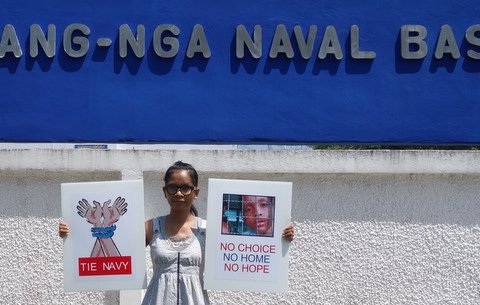Two Thailand-based journalists were charged on Thursday with defamation and violation of the Computer Crimes Act for citing a Reuters article that contained allegations against members of the Royal Thai Navy.
Australian editor Alan Morison and Thai reporter Chutima Sidasathian of Phuketwan online news could face up to seven years in prison and fines amounting to US$3,000.
Following arraignment and five hours in holding cells, 100,000 baht (US$3,000) bail for each of the two defendants was posted on their behalf by supporters at the Andaman Foundation.
The pair are currently out of custody and due to return to court on 26 May for trial.
“This experience has only made us more determined to fight the charges,” Morison told DVB on Thursday shortly after his discharge. “We’ve done nothing wrong.”
Morison and Chutima were first informed of the impending charges in mid-December, five months after publishing an article that summarised an investigative report by Reuters news agency. Phuketwan cited a paragraph suggesting that some Thai officials profited directly from the smuggling of Rohingya Muslims from Burma.
Charges have not been brought against the authors of the contentious paragraph, Jason Szep and Stuart Grudgings. A Reuters spokesperson told DVB on Thursday that, “To our understanding, the complaint is under review by the authorities, but we have not been charged.”
Szep and another Reuters reporter, Andrew RC Marshall, were awarded a Pulitzer Prize on Monday for their reports on Burma’s Rohingya Muslims, whom the United Nations has termed one of the world’s most persecuted peoples.
[related]
The stateless minority bore the brunt of two years of renewed communal violence in western Burma, where decades-long tension between Buddhists and Muslims exploded in a rash of riots that has left around 200 dead and more than 140,000 displaced.
Many have fled the country as a result of the conflict, often on boats that pass through Thai waters en route to Muslim-majority Malaysia. The award-winning Reuters coverage examined a network of human smuggling checkpoints, at which many Rohingya are thought to be intercepted, tortured, extorted and indefinitely detained.
The reports allege that some Thai naval officials abetted and profited from the scheme.
Phuketwan, an online news site founded by Morison in 2008, has been reporting on Thailand’s treatment of Rohingyas for several years. Reuters retained the assistance of Chutima to secure local contacts throughout their investigation, though an agency spokesperson said that her role was “very limited”.
Morison has criticised Reuters’ remove from the case, calling on the agency to speak up for media freedom. He has further insinuated that the charges are a clear case of targeting a “small, local organisation with little resources”, a suspicion that has been echoed by numerous rights groups including Human Rights Watch (HRW).
“Instead of being brave enough to stand up and defend themselves publicly, the Thai Navy plays ‘shoot the messenger’ with a small Phuket-based website with limited means to defend itself,” said Phil Robertson, Deputy Director of HRW Asia. It seems clear, said Robertson, that the Thai military is picking on locals instead of taking on an international agency with lots of money and lawyers, even though they produced the disputed content.
Robertson also emphasised that the Thai Navy has yet to address the allegations against them, which are fundamental to the controversy.
The Committee to Protect Journalists (CPJ) has similarly denounced the charges, and forecasted that the case could set a precedent of trepidation among journalists in Thailand. Upon passage of the Computer Crimes Act in 2007, some rights groups anticipated that the law could be used to censor the media, but this is the first case in which it has actually been levied against journalists.
“The formal defamation and Computer Crime Act charges brought today against two Phuketwan journalists aims ultimately to curb reporting on the Thai military’s apparent involvement in gross human rights abuses,” said Shawn Crispin, CPJ’s Southeast Asia representative. “Regardless of the case’s eventual verdict, the state-backed charges will cause self-censorship among all journalists covering the Thailand angle of Burma’s growing Rohingya refugee crisis.”
While the suspects have received substantial support from media rights advocates — “ludicrous” and “absurd” are among the many terms used to describe the case — Reuters has been relatively silent, but did tell DVB on Thursday that they “oppose the use of criminal laws to sanction the press — large or small, local or international — for publication on matters of serious public interest, like the Rohingya stories here.”
Thai officials have thus far been unavailable for comment.



